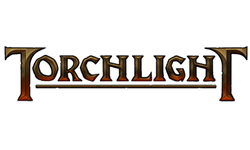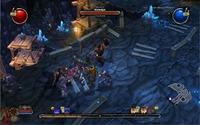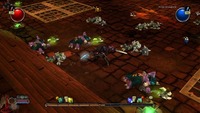|
|

|
PLATFORM
|
Xbox 360
|
BATTLE SYSTEM
|

|
INTERACTION
|

|
ORIGINALITY
|

|
STORY
|

|
MUSIC & SOUND
|

|
VISUALS
|

|
CHALLENGE
|
Very Easy
|
COMPLETION TIME
|
Less than 20 Hours
|
|
OVERALL

|
+ Fast pace can hook you in
+ Controls work well on a console
+ Impressive visual depth to the levels
- Little distinction between classes
- So easy it borders on boring for half the game
- Mechanics aren't explained at all
|
Click here for scoring definitions
|
|
|
Diablo II is a once-in-a-lifetime game that defined, dominated, and destroyed an entire subgenre singlehandedly. Randomized, action-RPG dungeon-crawlers remain so untouchable that eleven years later even the company that created it hasn't dared produce a sequel. The game's individual designers, however, have tried with varied levels of success to top their previous work. After the failure of Hellgate: London, former Blizzard employees' second collective shot at achieving past glory came in 2009 in the form of Torchlight, an itch-scratcher whose value was directly proportional to the size of your itch. The XBLA port brings it to a new crowd of itchy people, replacing "point and click" with "run and button mash" in an addictive game whose only flaw is how shallow and safe it is.
Although the background info on Torchlight's world is minimal, it seems to be a fantasy steampunk setting where might, magic, and machines are powered by an ore called ember. A new ember mine is discovered and the city of Torchlight springs up beside it to support those greedily excavating the mountain. Like any good Diablo clone, the mines run many levels deep and house a newly-awakened immortal evil at the bottom. The entire plot is shorter than this review, and side quests have no story or dialogue to them. It's a missed opportunity considering where the bar was set in recent action RPGs like DeathSpank, Fable III, and Too Human, but at least it does not bombard the player with a lengthy, unwanted story when all he wants to do is find more loot.
Before delving into the game, the player is tasked with selecting his starting class out of three options — Destroyer, Alchemist, or Vanquisher — whose descriptions make them sound like a melee fighter, a mage, and a ranged fighter. Thanks to the high number of shared skills between them and the lack of inherent strengths and weaknesses, their differences are negligible. An Alchemist with a two-handed axe can be just as adept as a Destroyer with a two-handed axe, so don't meditate too long before locking in the choice. Skills and spells in Torchlight are an odd step back from what the genre has done since the 90s. Each class has a screen full of skills that are gained and improved by allocating points, but they have no prerequisites aside from character level; there is no skill tree and hence no need to waste points on low level abilities. On the flip side, many of the early skills can be very useful, so points spent early aren't necessarily wasted.
Where things get weird is the heavy overlap between the classes. There are a slew of powerful passive abilities that every class can learn, covering such things as a higher critical hit rate, increasing armor, improving melee and ranged damage, et cetera. It is just as easy to have a beast of a Destroyer with several levels in passive dual-wielding, melee attack, and armor skills as it is to have the "mage" Alchemist dishing out dual damage to demons. The only difference is that the Destroyer's active skills will be of the manly, yelling sort that stun and knockback enemies while the Alchemist's will be of the magical sort that burn or freeze foes.
 The spartan HUD lets you admire the environments, although some extra info would have been nice.
The spartan HUD lets you admire the environments, although some extra info would have been nice.
|
|
A character can memorize four spells which cover the gamut of useful abilities. Spells have a level attached to them which affects their power, and on top of that every class has a passive skill that makes spells stronger. This further adds to the lack of individuality of a character. For example, it's possible to have the Summon Zombies spell in all four slots, and when combat begins slap the skill keys to instantly have twelve beefy zombies in the frontline who restore your health every time they deal damage. The pet can learn two spells as well, and if it also knows Summon Zombies, that's eighteen zombies whose base strength is determined by character level — not skills or stats — that anyone can have. At this point it doesn't matter if the protagonist is a ranged, melee, or magic user, and not a skill point needs to be wasted to pull this off.
These open options could be a strength if the game were a challenge and it was important to carefully focus on one play style or another, but Torchlight's biggest problem is how underwhelmingly easy it is. The challenge is so nonexistent that a character can allocate stat points as needed to use the best items of the moment without sticking to a consistent build. Thanks to low equipment requirements, a ranged mage who finds an awesome maul can put five points into strength and walk through foes for the next hour — something a Sorceress in Diablo II could never dream of. The low difficulty and short game length make it ultimately feel like Act 1 of Diablo II. Torchlight starts with slow, weak enemies, moves up to faster, stronger mobs about two thirds of the way through, is a decent challenge for the last couple levels, tosses an out-of-nowhere hard boss at you, and then ends right when Act 2 would start. The main story can be finished in seven hours on Normal. It doesn't help that there is absolutely no punishment for dying; a dead character resurrects at full health with all of his equipment.
A positive thing to be said is that the game plays well. Even without a mouse it is still easy to fight as a ranged attacker. The AI guesses which enemy an archer wants to attack based on the direction she is facing, and within about a 45 degree angle will automatically shift her focus to keep her attacking foes as they move around or die. It takes some getting used to, but it's fairly simple to run from a quick demon, turn on a dime to launch an arrow or two, and then flee some more. Ranged magic isn't quite as effective since spells can clip walls and detonate in the wrong place as a result. Sometimes you want to sling a fireball just to the side of an enemy and the game will pick a target and aim the spell right in its face, even if the environment is in the way. The auto-targeting is not perfect, but it works well more often than not and you wouldn't suspect this was a PC port if no one told you.
 Situation normal: lots of corpses and the hero is at full health.
Situation normal: lots of corpses and the hero is at full health.
|
|
Skills and spells are mapped to the triggers and two of the face buttons. Unfortunately, in the heat of battle this means only four abilities are conveniently accessed — a low number considering an endgame character should have at least four active skills he uses regularly, and four spells can be memorized on top of that. A second set of four abilities can be mapped as well, and the two skill configurations are toggled using the d-pad: not a great thing to press in a busy fight. The flaw here is that not all the 360 buttons are used. The left and right d-pad controls do nothing, the right analog stick zooms in and out and could be used for more, and clicking the left stick — about the most convenient thing to do with the left hand without interrupting the action — does nothing and could have been used to map a fifth ability or switch between configurations. Aside from the less than ideal implementation of the skill hotkeys, the game controls fine and moves at a fast pace.
The presentation is on par with other XBLA games. As already mentioned, the setting is unexplained and soulless in terms of storylines and memorable events, NPCs, and enemies. There isn't much voice-acting and there isn't much text to voice. On the bright side the graphics are colorful and almost cartoonish, and aesthetically the steampunk influences are cool. Although they have no impact on gameplay, it is neat that a ranged attacker can swap between bows, rifles, and dual-wielding pistols, and that the Alchemist can summon undead corpse minions as well as mechanical golems. Although floor layouts have 2D pathways, the backgrounds have detail and depth to them. Stairways and inaccessible levels in the distance give the illusion that the areas are larger than they are. The randomization of the dungeons, though, leaves something to be desired; they are totally linear and lack a sense of exploration. Each tileset has dozens of set pieces from which the levels are created. The scripted events in the environments start out cool, such as the first time a horde of spiders erupts from a grating or skeletons climb out of the ground on a bridge. When the same exact area appears on every floor for three floors in a row, it stops being cool and starts looking like lazy design.
Torchlight is an awkward game to assess. On one hand, the gameplay is a major disappointment in that it's worse than Diablo II in every way, but on the other hand it has no major flaws and, even for a hater of easy games like me, gets addicting once the Shadow Vault, an unending postgame dungeon whose enemies are tied to your level, becomes available. It would be nice if the skill system didn't make it so every class can be a damage-dealing, high defense, nearly-indestructible summoner who yawns his way through thousands of underpowered adversaries. A gamer in the mood for Diablo Lite, though, can still enjoy a breezy button masher that makes you feel like a god among insects. Anyone who has ever held a 360 controller should start on Hard, not Normal. Even the Very Hard setting is easy compared to the later Acts of Diablo II. The question of whether or not to purchase this game comes down to this: how big is your itch, and can it be scratched by a vanilla title lacking challenge and innovation? I ended up with a middling opinion, but some people have huge itches while others have no patience for games that don't improve upon their predecessors.
Review Archives
|









